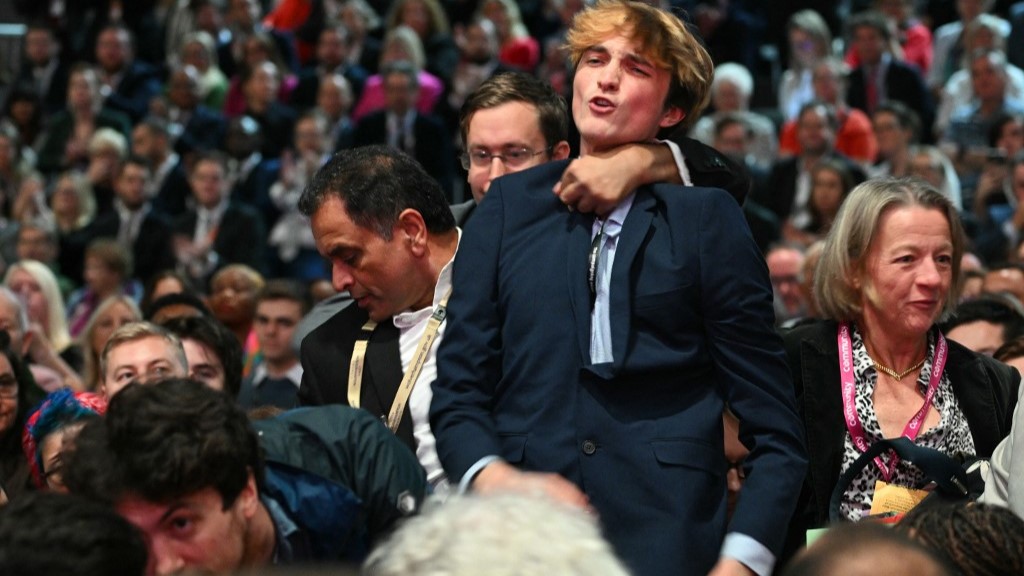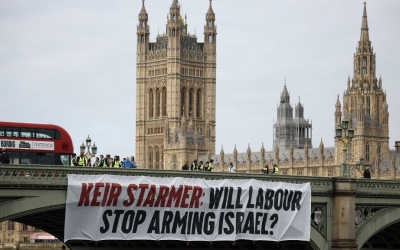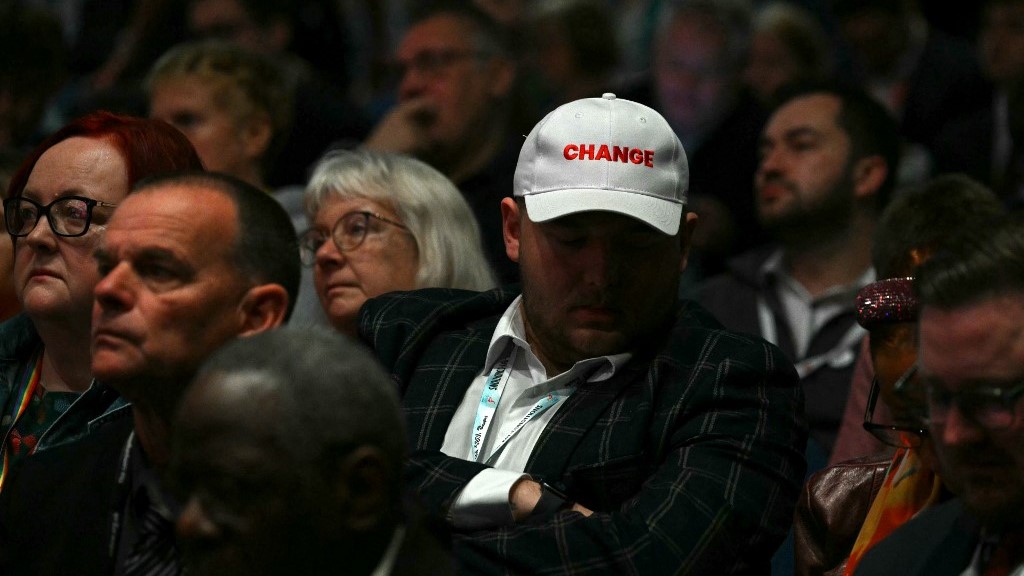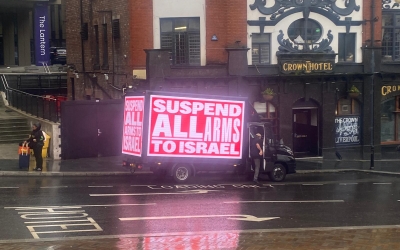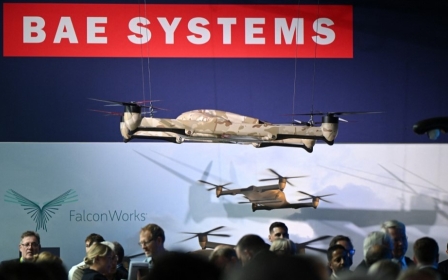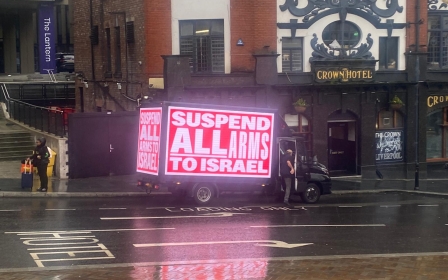Mixed messages on Israel and Palestine. What it was like at the Labour Party conference
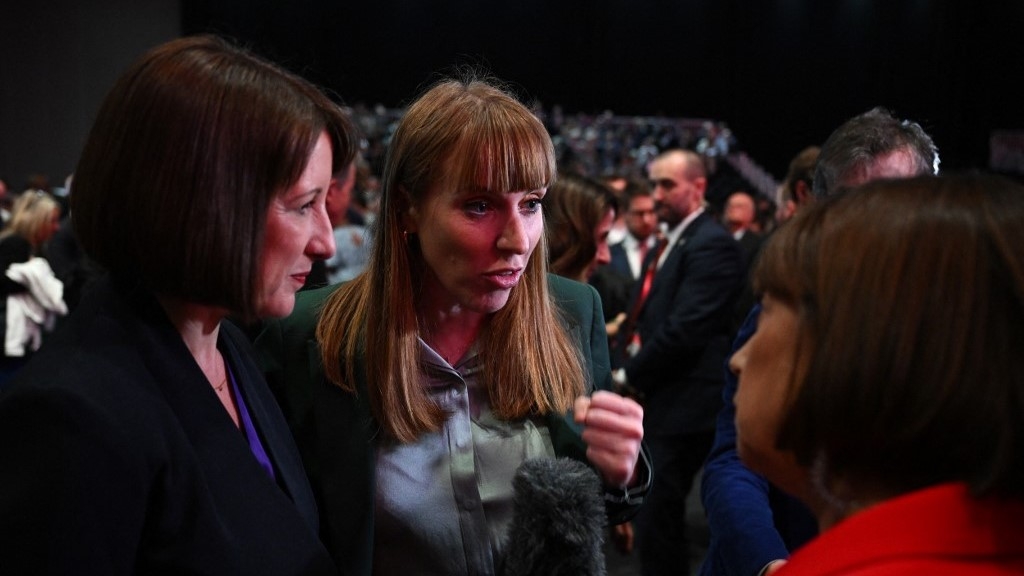
This year's rain-soaked Labour Party conference was a chance for the UK government to outline its plans now that it was back in power.
Instead, much of the focus seemed to be on the past, with senior Labour officials offering brief glimpses of sunshine during their speeches.
"The dark days are over" was a turn of phrase repeatedly heard in the run-up to Prime Minister Keir Starmer's big speech, which promised "light at the end of the tunnel".
The so-called "dark period", remembered by some attendees with shudders and grimaces, was a direct attack on Jeremy Corbyn's progressive and left-wing leadership between 2015 and 2020.
Most attendees, whether they were party members, campaigners or politicians, were keen to stress that Labour has become an entirely different party now.
New MEE newsletter: Jerusalem Dispatch
Sign up to get the latest insights and analysis on Israel-Palestine, alongside Turkey Unpacked and other MEE newsletters
After spending three days there, it certainly felt that way.
When two party members heckled Chancellor Rachel Reeves' speech on Monday, protesting the continued sale of arms to Israel, the chancellor proclaimed: "This is a changed Labour Party, a Labour Party that represents working people, not a party of protests," as security guards hauled them out.
The delegates gave her a standing ovation.
I spoke to one of the protesters, Jack, after he had been held in cuffs for an hour. He said a security guard called his friend a "weasel" while tackling him to the ground.
Reflecting on the crowd's response, Jack said their reactions said "a lot about the delegates and where the party has ended up over the last few years".
"We weren't particularly popular in that hall," he added.
But was Jack right?
Apparently so, though the conference attendees did not seem to represent the totality of the party's membership.
According to a recent poll, no fewer than three-quarters of Labour members back a full ban on arms sales to Israel, compared to the 30 out of 350 arms export licences that were suspended earlier this month.
Dawn of a new era
I went searching for dissenters and self-imposed exiles and found them at certain fringe events, generally looking depressed about the party's state.
At one such gathering in The Botanist bar on Sunday, left-wing members bemoaned the loss of Corbyn-era "socialist "policies and the government’s moves to crack down on illegal immigration.
One campaigner called for the abolition of all immigration controls, earning rapturous applause from the attendees. Left-wing backbench MP Nadia Whittome advocated for somewhat less radical pro-migration policies.
The mood was completely different at a party that night at a nearby Hilton, attended by Health Secretary Wes Streeting, Reeves and other ministers.
Here, the atmosphere was one of jubilation. The hundreds of attendees, many of them young and almost all smartly dressed, stood in sharp contrast to the small crowd at The Botanist. There were quite a lot of red ties, too.
A cheer went up as Pat McFadden, the chancellor of the Duchy of Lancaster, took to the stage to proudly declare the end of both Conservative rule and the Corbyn years, as well as the dawn of a new era.
There was no mention of the donations scandal involving the prime minister accepting money for work clothing from Labour peer Lord Waheed Alli.
No, the theme of this party was victory. The message was that Labour had won, was now in government and the country was supposedly saved. There was little discussion about specific policies.
Later in the evening, Anas Sarwar, the leader of Scottish Labour, confidently predicted the coming fall of the Scottish National Party (SNO), which was met with resounding applause.
In a side of the room, sipping a glass of wine, a former parliamentary candidate who had lost a safe Liberal Democrat seat told me he thought the leadership was not worried about how the war on Gaza might affect voting patterns.
“There’s a real danger we could be seeing the rise of ethnically and religiously based voting,” he warned ominously.
Yet, he also felt Gaza was an important issue for middle-class people, who “have enough money to worry about what’s going on there”.
He pointed to Oxford, where he thought the ongoing war was a concern for many left-wing, affluent and highly educated voters.
All five pro-Palestinian independent MPs elected in July, however, drew support from a largely working-class base.
Elsewhere at the conference, a former Labour MP was heard loudly and falsely declaring that a pro-Palestinian independent candidate, who had not made it to parliament, was a "Hamas supporter".
The MP would not respond to requests for clarification. Middle East Eye has contacted Labour for comment.
Later, on Tuesday, at a brunch hosted by Chatham House, a friendly young man told me that he was a parliamentary staffer for a well-known pro-Israel MP.
I expected him to recoil when I mentioned working for Middle East Eye, but he seemed intrigued instead. "I follow you on Twitter," he said.
He also appeared apologetic about his boss' publicly held opinions and emphasised rather firmly that he was "not responsible for the MP's views".
'A pass from the 2019 conference'
By Tuesday, it seemed that most of the people I spoke to did not quite know what to make of Labour’s policies towards Israel.
The party's approach has recently diverged from the Conservatives' full-throated support for the war - a stance Labour initially mirrored after the Hamas attack on 7 October.
Labour has made some significant moves signalling its devotion to international law, such as restoring funding to Unrwa and dropping Britain's objection to the International Criminal Court's judgement on whether to issue arrest warrants for Israeli leaders.
These policies, along with the partial arms ban, appear to have enraged Israeli Prime Minister Benjamin Netanyahu.
Despite this, many of the attendees I spoke to considered pro-Palestine sentiment to be a characteristic of “loony lefties” and Corbynites.
More than one person suggested it was tied to antisemitism.
Starmer himself, in the same speech on Tuesday where he accidentally called for the "return of the sausages" instead of the hostages, mocked a young protester who referenced the ongoing devastation in Gaza by saying: "This guy's obviously got a pass from the 2019 conference."
It appeared to be another dig at the Corbyn-era and the crowd duly roared with laughter.
But the party leadership also knows how to speak emotively about the war. Deputy Prime Minister Angela Rayner made an unexpected appearance at the conference's annual Palestine reception on Monday night alongside the Palestinian ambassador, Husam Zomlot.
She spoke in strong terms about how Israel’s conduct was “unacceptable” and how the humanitarian situation in Gaza was "beyond appalling".
At the same event, Middle East minister Hamish Falconer, a newly elected MP and former foreign office official, echoed the same sentiments.
Several Labour MPs who have barely spoken about Israel's ongoing siege and bombardment of Gaza snapped selfies with Zumlot.
This was a stark contrast to the next evening when Rayner addressed a Labour Friends of Israel event attended by an Israeli opposition leader, Yair Golan, who previously called for the starvation of Palestinians in Gaza.
Earlier in the conference, Golan had met Foreign Secretary David Lammy and Falconer. This comes after Netanyahu reportedly refused to meet Lammy during a trip to Israel in August because of Labour's support for the ICC.
At the same event, Reeves was photographed with the Israeli ambassador, Tzipi Hotovely, who has opposed the creation of a Palestinian state and suggested in January that it was legitimate to destroy every building in Gaza.
'In danger of criminal liability'
So, how pro-Israel is this new Labour Party? No one seemed to have a definitive answer.
A few people suggested that Labour was trying to have it both ways - positioning itself as the party of international law while keeping Israel as an ally - without going so far as to upset the US.
For example, party managers did not allow the words "genocide" and "apartheid" to appear in the title of a Palestinian Solidarity Campaign (PSC) fringe event in the conference brochure.
PSC director Ben Jamal told me Labour "still wants to treat Israel as a normal democratic state and therefore as a crucial ally".
Yet, some attendees working for NGOs and aid organisations were cautiously optimistic, though still highly sceptical, that a Labour government could do some good.
They all grimaced when asked about dealing with the Tories.
Meanwhile, the foreign secretary proclaimed "progressive realism" as his foreign policy doctrine, but none of the party members I spoke with could explain what that actually meant in practice.
Some stared dreamily into the distance as they imagined what it might entail. Others simply pointed to trade deals with the Gulf.
Many would say this is a party - and a government - still struggling to find the right tone and approach. But throughout the conference, it was obvious that the Corbyn era was well and truly over.
"Change" was the campaign slogan in July, and it could have referred to either the end of the Conservatives or the party of 2019.
On Gaza, Labour has also changed in just the last few months. Earlier this year, MPs were forbidden from backing a ceasefire. Now, opposing a ceasefire would make you look out of place. Who knows where the government will end up a few months from now?
At the PSC event on Monday, backbench MP Bell Ribeiro-Addy warned in what seemed to be a carefully considered and worded speech that the government was still "in danger of criminal liability for supplying weapons to Israel".
Most of the audience seemed to be former Corbyn supporters.
At one point, Ribeiro-Addy was interrupted by a woman shouting: "Leave the Labour Party." She was booed by the crowd.
Towards the end of the event, the same person, presumably not a Labour member, interrupted again to declare that the party is irredeemable. She eventually stormed out, shouting to the crowd: "Enjoy your wine and beer, while there’s a genocide on."
As the event continued, Jamal urged Labour members to "stay and fight" for Palestine from within the party. The applause he received was deafening.
At the end of the evening, chair Louise Regan said: "I hate to say it, but we do have wine and beer if anyone wants any."
Middle East Eye delivers independent and unrivalled coverage and analysis of the Middle East, North Africa and beyond. To learn more about republishing this content and the associated fees, please fill out this form. More about MEE can be found here.


